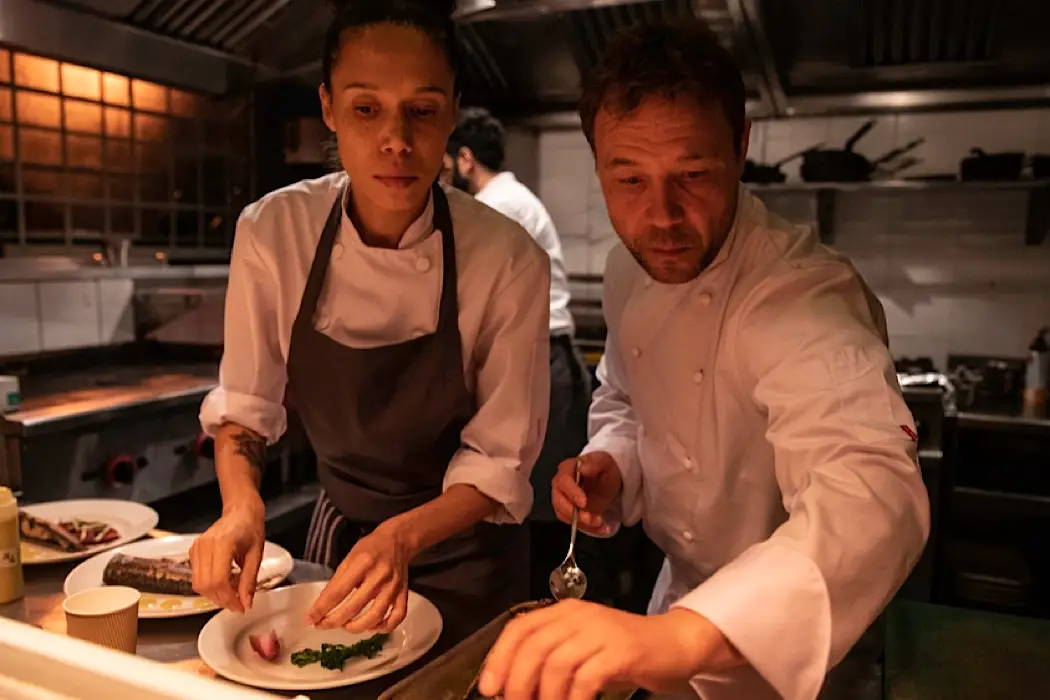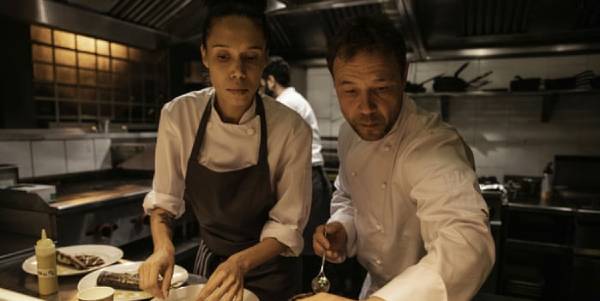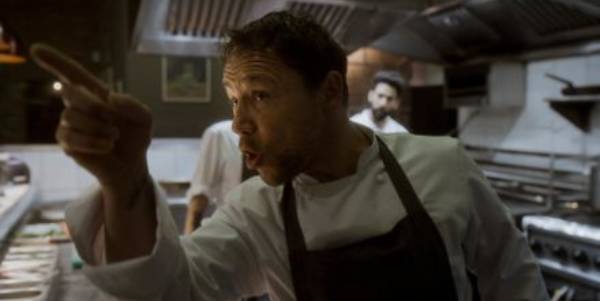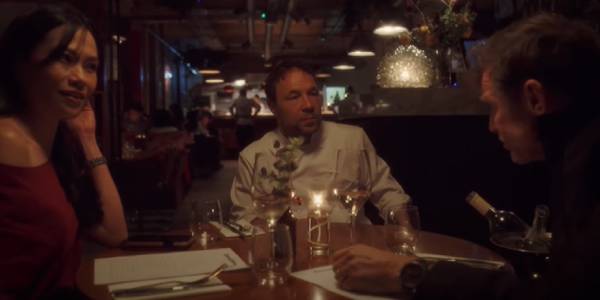London Film Festival 2021: BOILING POINT

Former film student from Scotland turned writer and film reviewer.
In a time before lockdowns and potentially lethal airborne viruses, there were few experiences more delightful, more social than a visit to a restaurant. In its bustling, caterwauling atmosphere was a sense of communality, of the excitement of a Friday night when the work is done and we get to relax with a c*cktail or two and some top quality grub. Few of us probably ever paid attention to what was going on behind the scenes. The shouting of chefs, dizzyingly fast waiters, and aggressively loud customers was just part and parcel of the experience, and one that added to the electric atmosphere of a busy restaurant.
It probably wasn’t until TV chefs became insanely popular that we as consumers began to understand the toll it took on hospitality staff to ensure everything runs smoothly. Anthony Bourdain‘s famous memoir Kitchen Confidential laid bare the lives of chefs who would routinely ingest copious amounts of drugs and alcohol to propel them through shifts, and Gordon Ramsay‘s series of kitchen shows (one of which was actually called Boiling Point) shined a light on the utterly stressful minutiae of day-to-day life in kitchens around the world. For all this, there’s now almost an expectation amongst diners for the kind of dinner theatre that a chef having a meltdown would provide, or a clash between a waiter and a particularly difficult customer.
Kitchen Nightmares
But what of those chefs, those waiters? What of their struggles to ensure a perfect evening of dinner and drinks for customers? In Philip Barantini‘s excellent Boiling Point, that question is answered. Filmed as one continuous, 90 minute take – replete with tracking shots, difficult blocking, and expertly executed set pieces – Boiling Point calls to mind the work of the Safdie Brothers, as well as Aneil Karia‘s Surge, in its unrelenting, anxiety-inducing pace and sense of barrelling towards an unstoppable tragedy. Some might say it’s like watching a car crash in slow motion, but it’s more like watching car crash after car crash after car crash, all in fast-forward. It’s deliciously absorbing and borderline impossible to take your eyes away from.

Adapted from Barantini‘s own short of the same name, Boiling Point centres on Andy (Stephen Graham) the head chef of a trendy restaurant in East London, as he prepares for a busy Christmastime rush. Andy’s life is falling apart: he has separated from his partner and hasn’t had much chance to see his son, he’s drinking too much and falling behind in his duties, and to top it off may be about to lose his underappreciated sous chef Carly (an excellent Vinette Robinson, holding her own against Graham‘s tour-de-force) to a rival restaurant.
Boiling Point begins with Andy’s arrival at Jones & Sons (a real-life restaurant in London’s Dalston district, lending an air of authenticity to proceedings) as he is immediately hit by one crisis after another: to begin with, there is an obnoxious health inspector, who docks two vital points from the restaurant’s rating; then there are missing neat supplies that were accidentally thrown out; then there is the French chef who has just started and can’t understand English accents; the other chef who is on the wrong station and isn’t comfortable with his tasks; waitresses who are late; cleaners who are even later; customers demanding off-menu items; a restaurant manager who cares more about Instagram than the quality of the cuisine; and a celebrity chef (a prickly Jason Flemyng) who has brought in tow a top London food critic. Each subplot is deftly navigated by Barantini and cinematographer Matthew Lewis, whose shaky camera snakes through the restaurant capturing the random buzz of tables. There may be an argument that Barantini has overcrowded his plate, that perhaps fewer subplots might’ve given more room for the main characters to breathe, but ultimately what is captured is the insane levels of busyness a restaurant like Jones & Sons would experience at that time of year. In this sense, Boiling Point feels utterly real and scarily plausible.
A Three Course Meal
Other characters have small moments too, revealing a microcosm of humanity which reminds the viewer that we all have inner lives: a waitress harbours ambitions of being an actor, a junior pastry chef attempts to hide his self-harm scars, a waiter moonlights as a DJ in a nearby nightclub. Barantini serves up these moments as an apéritif, giving tantalising glimpses of moments of drama before Graham enters the frame again and the camera swings around to follow him. Elsewhere, a young waitress endures the hostility of a particularly bigoted – and possibly racist – customer over the correct way to allow the wine to breathe.

The misadventures of the staff would be enough protein for any meal, but Barantini and writer James Cummings throw in a little extra on the side in the form of Flemyng’s Ramsay-esque celebrity chef Alastair Skye. Skye is Andy’s former boss and has his own agenda for dropping by this evening. Skye might be a little too flat as a character at times, coming across with the arrogant and pretentious swagger that is evocative of some real-life chefs with none of the characteristics which make him more appealing, but his scenes with Andy are always compelling. Graham, at this point, seems virtually incapable of submitting a bad performance, and every scene he inhabits here is volcanic for his presence. Andy is a man precariously close to the boiling point of the title and Graham does an impeccable job of communicating this through little more than a flash of the eyes or the soft tilt of his shoulders as he walks at times. A moment where he listens to Skye critique his dish speaks volumes without him actually saying a single word and proves Graham as one of the best actors of his generation.
Elsewhere, Robinson‘s Carly functions as the opposite of Graham‘s Andy: whereas he storms through every scene on the verge of a breakdown, screaming at staff and glowering at customers, Carly is quiet and taciturn, anchoring the bubbling drama for the most part until she reaches her own boiling point, culminating in a furious monologue towards the restaurant manager. It says much about Robinson that she is able to hold her own with Graham in every scene, that Carly is under as much pressure as Andy, but has a different way of dealing with it.

Barantini‘s decision to make a one-shot in a busy restaurant was a clever one. The style of filmmaking on offer is uniquely qualified to highlight the hustle and bustle of restaurant life, but is also incredible at inculcating the sense of barrelling towards a tragedy through a dozen little moments – a Chekovian scene where a couple specify a peanut allergy before they order their meal, and viewers await the obviously disastrous outcome – that spin like plates in the air as the staff try to keep them going. We know it’s a matter of time before one of those plates fall, and your heart will be in your throat until it does.
Conclusion
From the incredible acting to the expertly done cinematography to the at times astonishing set pieces, Boiling Point is the full meal. It captures the atmosphere and feeling of busy restaurant life and so succinctly highlights the very real danger that at any moment the whole thing can come crashing down. It’s such an obvious concept it’s a wonder it hasn’t been done this way before now, but Barantini has capitalised on this oversight and made a most impressive dish.
What’s your favourite movie set in a restaurant? Let us know in the comments!
Boiling Point is showing at the London Film Festival 2021.
Does content like this matter to you?
Become a Member and support film journalism. Unlock access to all of Film Inquiry`s great articles. Join a community of like-minded readers who are passionate about cinema - get access to our private members Network, give back to independent filmmakers, and more.












